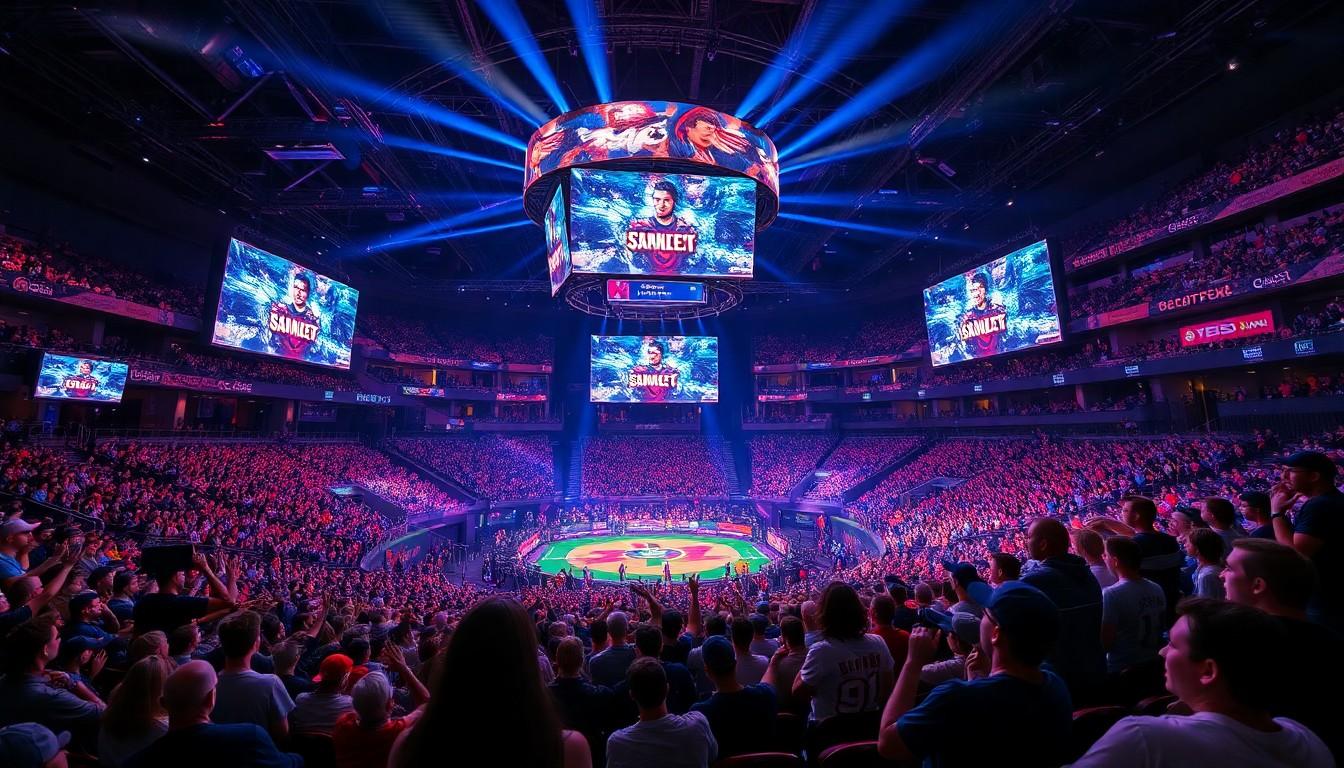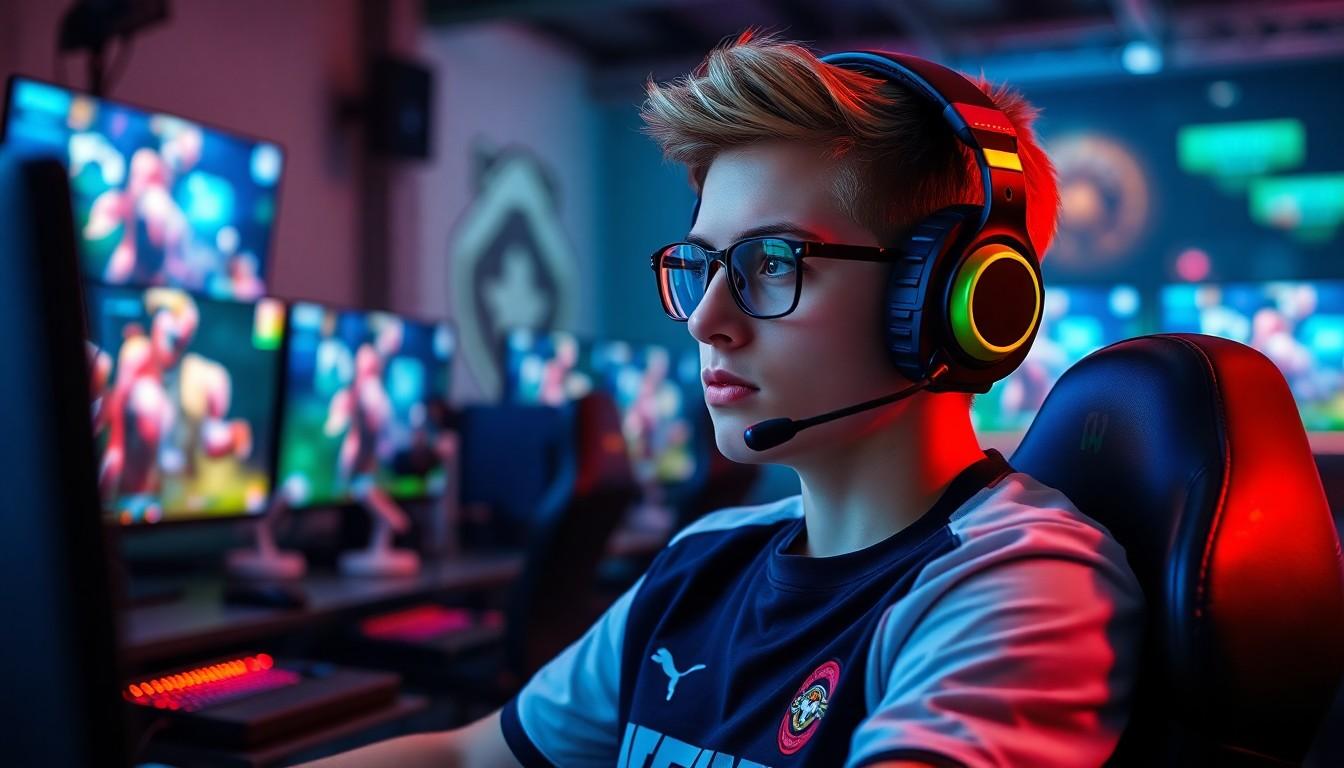In a world where athletes sweat it out on fields and courts, a new contender is rising from the glow of computer screens: esports. But wait, can clicking buttons and strategizing with friends really qualify as a sport? Spoiler alert: it absolutely can! As the lines between traditional sports and digital competition blur, it’s time to unpack why esports deserves a spot in the sports arena.
Picture this: intense rivalries, breathtaking teamwork, and nail-biting finishes—all while snacking on a bag of chips. Esports isn’t just about gaming; it’s a showcase of skill, strategy, and dedication. So grab your controller and join the conversation as we dive into the fascinating world of competitive gaming and reveal why esports is more than just a pastime.
Defining Esports
Esports represents a rapidly growing domain within the competitive landscape, often drawing comparisons to traditional sports. Understanding what constitutes a sport provides essential context for this comparison.
What Constitutes a Sport?
A sport typically involves organized competition with defined rules and objectives. Activities require skill, physical exertion, and often, teamwork. Examples include basketball, football, and tennis. Esports fulfills these criteria through competitive gaming, with professional players and teams competing in tournaments. Skillful gameplay and strategy underpin success, much like in traditional sports. Emotional and psychological resilience during intense matches plays a significant role in performance. Recognition from official governing bodies and establishment of professional leagues further solidifies esports as a legitimate sport.
Overview of Esports
Esports encompasses video game competitions held between teams or individuals. Popular titles include League of Legends, Dota 2, and Counter-Strike: Global Offensive. Audiences engage through live events and streams, showcasing a massive entertainment platform. Participants train rigorously, honing reflexes and strategies over countless hours. Developing teamwork aligns with the more conventional sports structure, often involving coaches and analytics. Financial investment in sponsorships and broadcasting rights mirrors traditional sports, illustrating substantial commercial viability. Over recent years, esports has gained traction, securing recognition in both cultural and athletic spheres.
The Growth of Esports

Esports has rapidly gained traction in recent years, establishing itself as a significant player in the competitive landscape.
Popularity and Audience Engagement
Massive viewership numbers characterize esports events. Platforms like Twitch and YouTube attract millions of viewers who tune in to watch tournaments live. A 2022 report indicated that esports reached over 500 million global viewers, showcasing its growing appeal. Fan engagement is vibrant, with communities forming around favorite teams and players. Social media amplifies this connection while fostering discussions and interactions among fans. Major esports tournaments fill stadiums, featuring passionate attendees. This level of enthusiasm mirrors traditional sports, indicating a shift in how audiences experience competition.
Economic Impact on the Sports Industry
The economic influence of esports is undeniable. Revenue figures suggest that the industry generated over $1 billion in 2022. Sponsorship deals play a vital role in this growth, as brands increasingly recognize the potential of esports to reach younger audiences. Numerous partnerships between teams and companies enhance visibility and drive investments. Additionally, the demand for esports-related merchandise, from apparel to gaming gear, continues to rise. Job creation is notable, with thousands of positions emerging in areas like event management, marketing, and game development. This economic impact positions esports as a vital and evolving sector within the larger sports industry.
Skills and Competition in Esports
Esports demands a unique blend of mental and physical skills. Players engage in fast-paced decision-making, requiring quick reflexes and hand-eye coordination. They often train for hours to improve their reaction times and precision. High-level players must analyze opponents’ strategies while executing complex maneuvers under pressure. Mental endurance plays a crucial role, as competitors manage stress and maintain focus throughout long matches.
Mental and Physical Skills Required
Cognitive abilities and reaction times differentiate top-tier esports athletes. Players develop critical thinking skills through constant analysis of game mechanics and opponent behavior. Physical capability complements mental acuity; many professional gamers experience physical strain and must focus on ergonomics. Extensive practice leads to mastery, where muscle memory becomes vital for executing intricate game moves seamlessly.
The Role of Teamwork and Strategy
Collaboration is pivotal in esports. Players work within teams to devise strategic plans tailored to specific opponents. Effective communication ensures that all members coordinate their actions during intense gameplay, maximizing efficiency. Teams frequently engage in scrims, which refine their strategies and combat tactics. Success in competitive matches often hinges on executing complex strategies while adapting to opponents’ movements in real-time.
Recognition of Esports as a Sport
Esports has gained significant recognition, with various organizations and events governing its competitive landscape.
Governing Bodies and Regulations
Various governing bodies oversee esports, establishing regulations that promote fair play. Notable organizations, such as the International Esports Federation (IESF) and the Electronic Sports League (ESL), create structured frameworks for tournaments. These institutions help ensure transparency in competitions by enforcing rules and maintaining player conduct standards. Furthermore, licensing agreements and age restrictions safeguard participants, mirroring traditional sports governance. With clear regulations, esports cultivates legitimacy as a sport within both player communities and audiences.
Comparisons to Traditional Sports
Aspects of esports closely resemble traditional sports, fostering similarities across various elements. Both arenas involve organized competitions featuring teams or individual athletes who compete based on defined rules. Physical exertion plays a role in both areas, with esports demanding high levels of dexterity and mental acuity. For example, players train for long hours to hone their skills, mirroring the rigorous practice regimens of athletes in sports like basketball and football. In terms of viewership, esports events attract millions and enjoy substantial media coverage, akin to what major leagues experience, validating their status in the sporting world.
Cultural Perspectives on Esports
Esports increasingly receives recognition in mainstream culture. Diverse viewpoints shape the understanding of its status as a sport.
Acceptance in Society
Acceptance of esports in society grows as traditional sports fans acknowledge its legitimacy. Major networks broadcast esports events, reflecting changing attitudes. Prominent sponsorships from well-known brands enhance this acceptance further. Academic institutions now offer scholarships for esports athletes, legitimizing their efforts at a collegiate level. This shift demonstrates that esports holds value and significance within competitive fields.
Youth Involvement and Trends
Youth involvement in esports represents a significant trend, fueling its popularity. Players, often as young as 13, engage in competitive gaming, showcasing remarkable talent and dedication. Online communities foster connections among peers passionately sharing gaming experiences. Influencers and streamers play crucial roles, creating shared cultural moments that resonate with younger audiences. This demographic’s active participation continues shaping trends in both gaming and overall perceptions of esports.
Conclusion
Esports has firmly established itself as a legitimate sport in today’s competitive landscape. With its unique blend of skill teamwork and strategic depth it mirrors traditional sports in many ways. The intense training dedication and mental resilience required from players highlight the serious nature of this discipline.
As the industry continues to grow attracting millions of viewers and significant investment esports is reshaping perceptions of competition. The recognition from governing bodies and mainstream culture further solidifies its place alongside traditional sports. Embracing esports opens up a world of excitement and engagement for fans and players alike.

